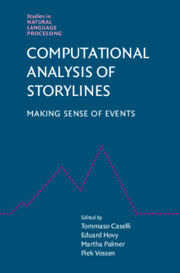Book contents
- Frontmatter
- Contents
- List of Contributors
- Introduction and Overview
- Part One Foundational Components of Storylines
- Part Two Connecting the Dots: Resources, Tools, and Representations
- 7 The Richer Event Description Corpus for Event–Event Relations
- 8 Low-Resource Event Extraction via Share-and-Transfer and Remaining Challenges
- 9 Reading Certainty across Sources
- 10 Narrative Homogeneity and Heterogeneity in Document Categories
- 11 Exploring Machine Learning Techniques for Linking Event Templates
- 12 Semantic Storytelling: From Experiments and Prototypes to a Technical Solution
- Author Index
7 - The Richer Event Description Corpus for Event–Event Relations
from Part Two - Connecting the Dots: Resources, Tools, and Representations
Published online by Cambridge University Press: 06 November 2021
- Frontmatter
- Contents
- List of Contributors
- Introduction and Overview
- Part One Foundational Components of Storylines
- Part Two Connecting the Dots: Resources, Tools, and Representations
- 7 The Richer Event Description Corpus for Event–Event Relations
- 8 Low-Resource Event Extraction via Share-and-Transfer and Remaining Challenges
- 9 Reading Certainty across Sources
- 10 Narrative Homogeneity and Heterogeneity in Document Categories
- 11 Exploring Machine Learning Techniques for Linking Event Templates
- 12 Semantic Storytelling: From Experiments and Prototypes to a Technical Solution
- Author Index
Summary
A variety of approaches exist for annotating temporal and event information in text, but it has been difficult to compare and contrast these different corpora. The Richer Event Description (RED) corpus, as an ambitious annotation of temporal, causal, and coreference annotation, provides one point of comparison for discussing how different annotation decisions contribute to the timeline and causal chains which define a document. We present an overview of how different event corpora differ and present new methods for studying the impact of these temporal annotation decisions upon the resulting document timeline. This focus on illuminating the contribution of three particular sources of information – event coreference, causal relations with temporal information, and long-distance temporal containment – to the actual timeline of a document. By studying the impact of specific annotation strategies and framing the RED annotation in the larger context of other event–event relation annotation corpora, we hope to provide a clearer sense of the current state of event annotation and of promising future directions for annotation.
Keywords
- Type
- Chapter
- Information
- Computational Analysis of StorylinesMaking Sense of Events, pp. 145 - 162Publisher: Cambridge University PressPrint publication year: 2021



